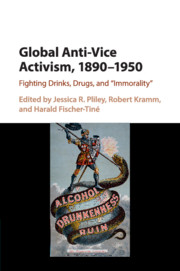Book contents
- Frontmatter
- Contents
- List of figures
- List of tables
- Notes on contributors
- Acknowledgments
- 1 Introduction: a plea for a “vicious turn” in global history
- PART I HEALTH AND THE BODY
- PART II DRINKS AND DRUGS
- PART III PROSTITUTION AND SEX TRAFFICKING
- 10 The FBI's White Slave Division: the creation of a national regulatory regime to police prostitutes in the United States, 1910–1918
- 11 Anti-vice lives: peopling the archives of prostitution in interwar India
- 12 China's prostitution regulation system in an international context, 1900–1937
- 13 “Hey, GI, want pretty flower girl?”: venereal disease, sanitation, and geopolitics in US-occupied Japan and Korea, 1945–1948
- 14 Global anti-vice activism: a postmortem
- Index
11 - Anti-vice lives: peopling the archives of prostitution in interwar India
from PART III - PROSTITUTION AND SEX TRAFFICKING
Published online by Cambridge University Press: 05 July 2016
- Frontmatter
- Contents
- List of figures
- List of tables
- Notes on contributors
- Acknowledgments
- 1 Introduction: a plea for a “vicious turn” in global history
- PART I HEALTH AND THE BODY
- PART II DRINKS AND DRUGS
- PART III PROSTITUTION AND SEX TRAFFICKING
- 10 The FBI's White Slave Division: the creation of a national regulatory regime to police prostitutes in the United States, 1910–1918
- 11 Anti-vice lives: peopling the archives of prostitution in interwar India
- 12 China's prostitution regulation system in an international context, 1900–1937
- 13 “Hey, GI, want pretty flower girl?”: venereal disease, sanitation, and geopolitics in US-occupied Japan and Korea, 1945–1948
- 14 Global anti-vice activism: a postmortem
- Index
Summary
The archive is anything of which a set of questions is asked and the nature of the archive is largely, but not entirely, defined by the nature of questions asked of it. The problem therefore is not of sexuality and the archive per se, or of gaps in the archives. It is a question of playing one archive against another, of conversations within and outside of archives, of romancing the archives, of using parallel, alternative, official, and popular archives simultaneously. It is in such interplay that more interesting stories are revealed.
Having spent ten years working on “anti-vice” campaigns in colonial India, looking back on this research I am often struck by the busyness of the archives, and the diversity of the people one meets there. Beyond the staff and colleagues in particular archives, the most recurrent person one meets in the archives is oneself; constantly refiguring both the archive and the researcher by the questions one asks of the indexes, cartons, and stacks. But in the diverse archive I have constructed regarding the regulation of prostitution in interwar India, two very different sets of people emerge: the campaigners; and the campaigned against/for. Neither set is stable nor homogenous. Campaigners included disciplinarians, libertarians, internationalists, Indian nationalists, and social reformers. Depending on their approach, the prostitute was campaigned against, or with, and for. The opinion of prostitutes regarding the latter distinction is rarely archived. However, at often random and unpredictable points in this decade of research, documents have emerged which suggest a glimmer of insight into the lives of women who worked with sex. These women emerge as victims and agents, entrepreneurs and commodities, as defiant but also, as will be shown below, often violently debased.
But as surprising as the variety of individuals in the documents were the scalar worlds they offered insights into. The brothel was often a local, regional, national, imperial, and international space, all at once. As the League of Nations found out during its 1931 traveling commission of enquiry into traffic in women and children in the East, there was very little evidence of international trafficking in India. But the imperial government and its official and non-official populations, as well as Indian entrepreneurs and laborers, were internationally mobile, thus making diseased prostitutes in India a transnational problem.
- Type
- Chapter
- Information
- Global Anti-Vice Activism, 1890–1950Fighting Drinks, Drugs, and 'Immorality', pp. 246 - 269Publisher: Cambridge University PressPrint publication year: 2016
- 3
- Cited by



